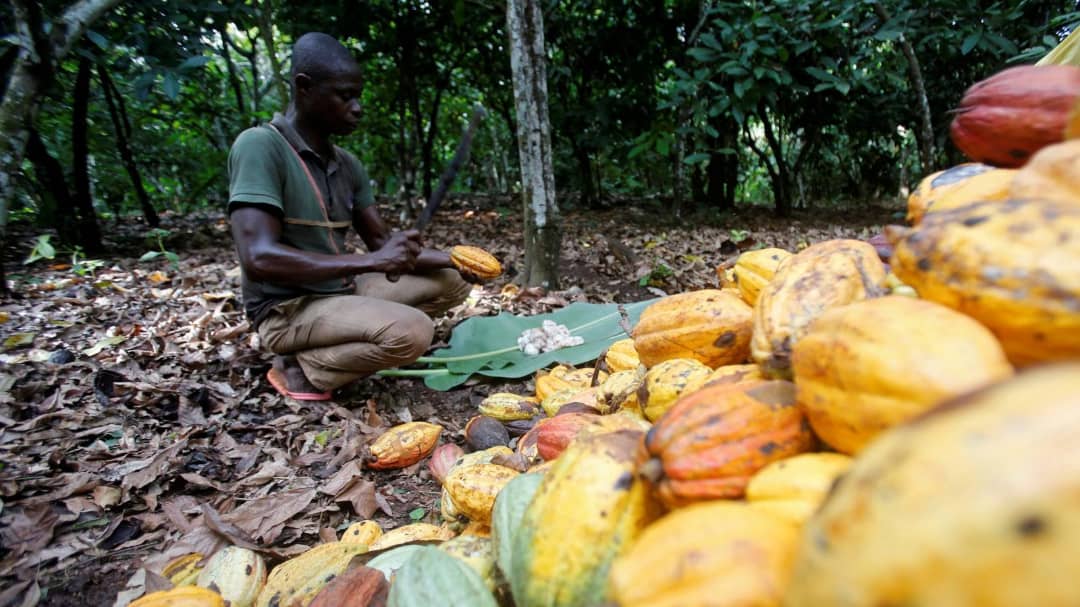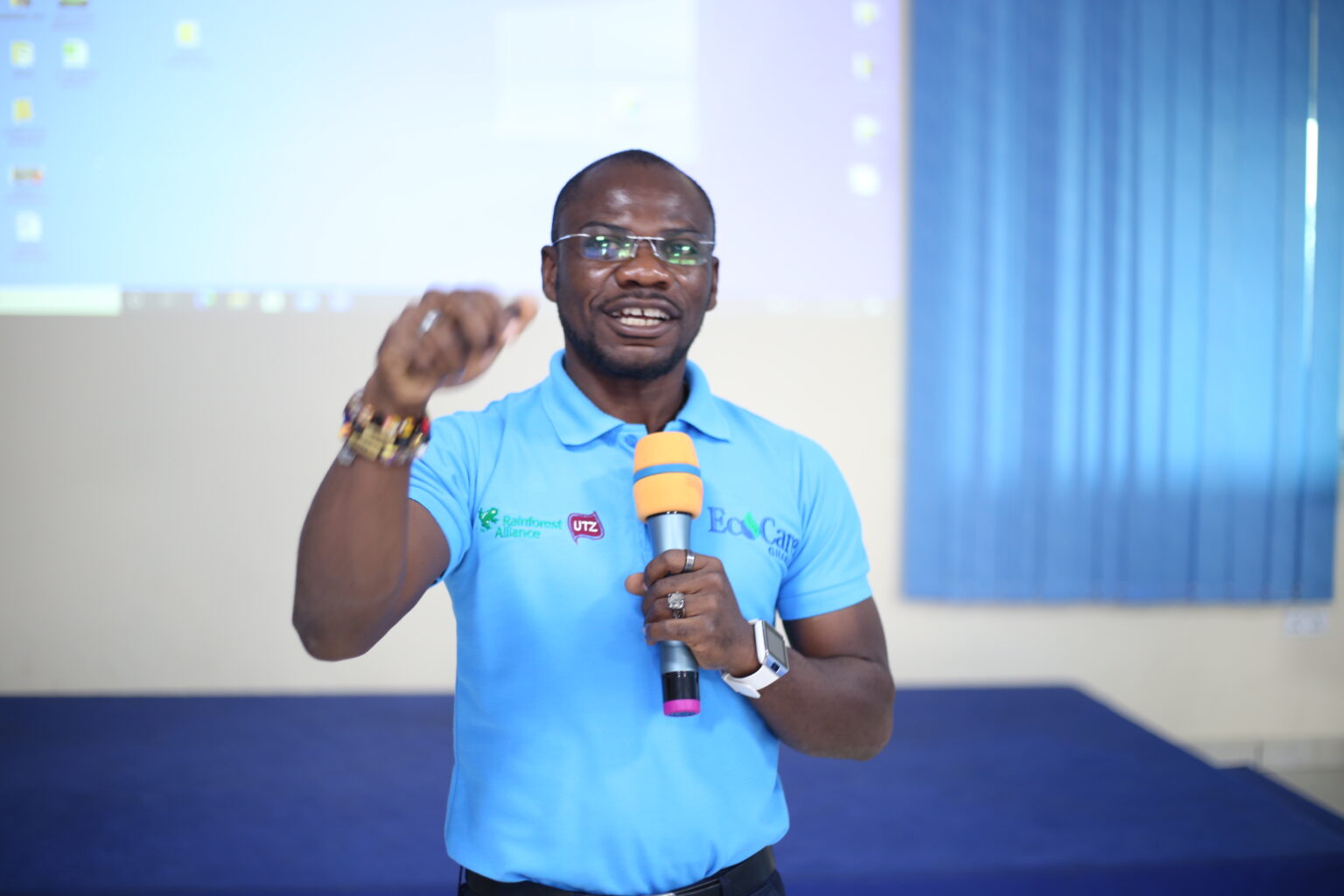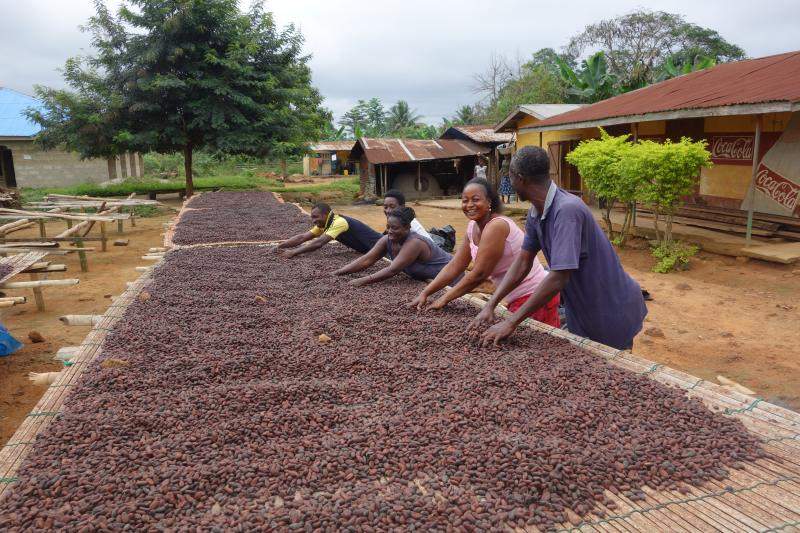Climate Change & Energy
Ending imported deforestation in the cocoa sector: Ghana urged to introduce new reforms
Source: ghenvironment.com - March 30, 2021

A farmer works on cocoa pods at his farm
As the second largest producer of cocoa in the world, the government of Ghana has been urged to introduce the needed laws and reforms to end imported deforestation and other negative factors affecting the cocoa industry.
According to the Senior Advisor at Mighty Earth, a global environmental campaign organization that works to protect forests, conserve oceans, and address climate change, Mr Samuel Mawutor, the cocoa industry is moving towards human rights, environmental and due diligence regulation, with consumer countries passing laws to end imported deforestation and it is imperative that, producer countries like Ghana emulate such action to be at par with them.
Mr Mawutor made the call at the launch of the Easter Chocolate Score Card in Ghana which was facilitated by Ecocare Ghana in partnership with Ghana Civil-Society Cocoa Platform (GCPP). The international launch was however done in Washington D.C by five international non-governmental organization namely, Be Slavery Free, Green America, Inkota, Mighty Earth and National Wildlife Federation.
The 2021 Easter scorecard ranks and grades chocolate companies on key sustainability issues such as Human Rights, Due Diligence, Transparency & Traceability, Child Labor, Living Income, Deforestation & Climate and Agroforestry. The companies selected ranged from the largest cocoa traders and chocolate manufacturers in the industry to smaller innovative companies.
Each company received an “egg score” for each individual category with the “good egg” prize awarded to corporate accountability and responsibility companies, while “rotten egg” was awarded to a company that was not only unresponsive to questionnaires but also had demonstrated problematic track record of poor performance on cocoa sustainability.
Speaking at the launch via zoom from his US base, the Senior Advisor indicated that, Ghana as a producing cocoa country can learn a lot from the outcome of the Easter Score Card to improve the cocoa sector to benefit the country, as well as the living condition of the farmer who produces the cocoa beans.
“It is not enough to say we are the world largest producer of cocoa; it doesn’t matter. We should rather be talking about being the world’s largest earner of cocoa or chocolate by putting in place the right measures to achieve the target and that is where we will see real transformation among the farmers”, he said.
He therefore suggested the addition of value to the cocoa beans produced locally by studying new development modules in the cocoa sector.
The cocoa farmer, he indicated, also needs to be provided with the right price through the “living income differential” price.
Most cocoa farmers make less than $1.00 a day with average female cocoa farmers paid as little as $0.32 per day, well below the extreme global poverty line of $1.90 a day. Living in terrible poverty, cocoa farmers are more vulnerable to hunger, malnutrition, health crises, and a host of other social challenges including child labor.
“The COCOBOD must be seen to be speaking for the farmers and being responsive to their needs by ensuring that they get the right income”, he added.
On child labour, a study conducted before the pandemic estimated that around 1.6 million children work in the cocoa sector, most of whom carry out hazardous forms of child labor. Despite voluntary corporate efforts promising to end it, the prevalence of child labor has increased by 14% over the past decade. The same report revealed a significant increase in the number of child laborers being exposed to harmful pesticides (from 5% to 24%) along with an increase in injuries, impacts on health and level of care needed (including hospitalization). These children are being robbed of their future, and abused.
According to Mr Mawutor, Ghana should speed up efforts to end child labour in the cocoa sector as many chocolate producing companies in the world per the score card is putting the necessary measures towards ensuring zero child labour in their supply chain.
He said, deforestation in the cocoa sector must also be tackled with all seriousness.
Localising the score card
On his part, the Managing Campaigner for Ecocare Ghana, Mr Obed Owusu-Addai said, cocoa production is bedeviled with high incidences of human rights abuses, especially Child labour.
“Environmentally, it is also considered as one of the major causes of forest loss both in Ghana and Cote d’Ivoire. These two issues have become a major concern among cocoa stakeholders globally and the consensus among stakeholders is that these two issues are only visible symptoms of the actual problem which is low and unequitable cocoa prices on the international market leading to farmer poverty”, he noted.
He revealed that, majority of the financial benefits however go to multi-national cocoa purchasing and processing companies based in Europe and the United States of America, with the companies annually declaring multi-million-dollar profit and pay the top executive huge performance bonuses at the expense of cocoa farmers who labour every day and cannot even afford one-square meal a day.
He has therefore challenged the media to go beyond some of the flashy glittering things that the multi-national cocoa companies do such as sponsoring events and functions and investigate how they are truly impacting the lives of cocoa farmers.
“If you take all the indicators, agro forestry and deforestation which have become an international topic and in the context of Ghana, what are the things these companies are putting in place in their corporate document to ensure that their footprint do not lead to further deforestation and how are they programming their activities to support local producers to ensure that their supply chain does not have deforestation related cocoa beans. The other indicator is child labour and how are these companies putting in place systems to ensure that the supply chain does not get entangled with issues of child labour”? he asked.
He said, there is therefore the need to have a more refined version of the Chocolate Score Card to be done locally by getting indicators to score local entities starting next year.

Managing Campaigner for Ecocare Ghana, Mr Obed Owusu-Addai
The Coordinator for the Ghana Civil-Society Cocoa Platform, Sandra Kwabea Sarkwah noted that, Ghana is still battling with what constitute an illegal cocoa.
She has therefore called for a governance reform to tackle human rights, due diligence and environmental issues, adding that, the Ghana Civil-Society Cocoa Platform would continue to create the avenue for cocoa farmers by building their capacity to voice out issues confronting them.
“As civil society actors in Ghana, we will continue to give our full support to the government and then to make sure that we put in a lot of effort on the national and international level to ensure that companies redeem this commitment to pay the living income differential as it has been the commitment they have made”, she assured.

 Managing Campaigner for Ecocare Ghana, Mr Obed Owusu-Addai
Managing Campaigner for Ecocare Ghana, Mr Obed Owusu-Addai


 A farmer works on cocoa pods at his farm
A farmer works on cocoa pods at his farm
